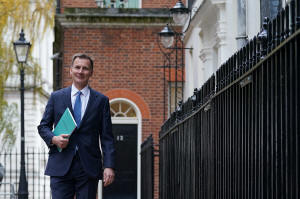No money? Next UK government's budget is hostage to economy
 Send a link to a friend
Send a link to a friend
 [January 08, 2024] By
William Schomberg [January 08, 2024] By
William Schomberg
LONDON (Reuters) - Britain's next government will have little room to
cut taxes or increase spending - at least according to bleak forecasts
from the country's budget office.
But if the economy performs only a little better than expected, whoever
wins an election expected later this year could have tens of billions of
pounds more fiscal flexibility.
Under that brighter scenario, Prime Minister Rishi Sunak's Conservatives
could find it easier to lower the highest tax burden since World War Two
while still meeting debt promises.
If the opposition Labor Party takes power, it would have more room to
fund its annual 20 billion-pound ($25 billion) net zero investment plan.
Of course, economic forecasting is notoriously inaccurate and the Office
for Budget Responsibility (OBR) has proven too optimistic about the
economy's prospects before.
If things go worse than it expects, the next government could face an
even tighter budget squeeze.
PARTIES PLEDGE DEBT CUT
The Conservatives and Labor both promise to lower Britain's public debt
burden, mindful of how the huge tax cuts planned by former Prime
Minister Liz Truss hammered bond markets in 2022.
Debt is nearly 100% of economic output after massive public spending
during the COVID pandemic and the 2022 energy price surge, on top of the
heavy costs of the 2008-09 financial crisis.

Tackling debt is harder with the economy stagnating, while demands for
public services - such as health spending for Britain's ageing
population - continue to mount.
Finance minister Jeremy Hunt has promised to get debt falling as a share
of gross domestic product within five years.
The current forecasts show him meeting that target only narrowly, with
less room for maneuver than his predecessors.
But that "fiscal headroom" is likely to change, given the range of
factors that feed into the OBR's view. The question is whether the
headroom expands or gets even tighter.
THE PRODUCTIVITY WILDCARD
A big wild card is what happens to productivity growth which has slowed,
weighing on the economy and tax revenues.
If the government can get productivity growing closer to its pre-2008
pace - 1.5% a year rather than 1.0% as expected by the OBR - the
headroom for meeting Hunt's target would rise to 72 billion pounds in
five years' time, the OBR says.
That would dwarf the current 13 billion-pound estimate and approach the
size of Britain's 82 billion-pound public education budget during this
financial year.
But productivity could worsen. Should it grow by only 0.5% a year - in
line with the past decade - the government would miss its debt target by
more than 40 billion pounds, the OBR estimates, implying tax hikes, more
spending cuts or yet more debt.
The OBR has overestimated the chances of a productivity improvement in
the past. But corporate leaders say Hunt's announcement in November that
tax incentives for business investment will be made permanent is a step
forwards. The rise of artificial intelligence is also raising
productivity hopes.
How inflation behaves is another important factor, and not just because
of expensive payouts on Britain's huge stock of index-linked government
bonds.

[to top of second column] |

Chancellor of the Exchequer Jeremy Hunt leaves 11 Downing Street for
the House of Commons to deliver his autumn statement, in London,
Britain, November 22, 2023. Stefan Rousseau/Pool via REUTERS/File
Photo

If a future jump in inflation is driven by import prices, chiefly
those of oil and gas, the public finances would take a hit, the OBR
says.
But if that jump in prices comes from higher wages and company
profits, tax revenues would go up, potentially helping bring down
debt, although the Treasury would face calls to increase spending to
match inflation.
BETS ARE ON INTEREST RATES FALLING
Another big assumption by the OBR is what is likely to happen to
interest rates which the Bank of England has raised to a 15-year
high of 5.25% to fight inflation.
Britain spent more as a share of GDP on debt interest than any other
Group of Seven country except for Italy in 2022, mainly because it
sells a lot of bonds linked to inflation.
In November, the OBR forecast net interest costs in three years'
time would be an annual 109 billion pounds, more than double its
assumption less than two years earlier.
The government's debt interest bill looked set to settle about 2% of
GDP higher than it used to be, with the difference alone equivalent
to the entirety of the defense budget, the Institute for Fiscal
Studies think tank said at the time.
But since November, rate expectations have fallen fast.
Investors now see Bank Rate dropping to 4% as soon as December,
three years earlier than the OBR assumed.
Carl Emmerson, IFS deputy director, said a fall of one percentage
point in Bank Rate and on government bond yields would save the
Treasury about 15 billion pounds a year, rising to 19 billion pounds
in five years' time.
To put that into context, Britain spent 12.8 billion pounds on
overseas aid in 2022.

"They're pretty chunky numbers," Emmerson said.
Hunt may be able to turn some of the fall in expected future debt
costs into tax cuts as soon as March 6, when he is due to make
probably his final budget statement before the election.
THE RULES KEEP CHANGING
Perhaps the biggest variable of all is what fiscal rules the next
government adopts.
While both main parties say they want to bring down debt as a share
of GDP, Labour has not been specific about details and the
Conservatives, if re-elected, could announce a new rule.
Since 2011, successive Conservative-led governments have introduced
six different fiscal rules.
Emmerson said ministers also needed to stop using improvements in
the fiscal outlook to cut taxes or raise spending while any
deterioration led to more bond sales.
"If whenever things get worse, you end up borrowing more but
whenever things look better, you end up giving tax cuts, you'll
always end up borrowing more than you're forecasting," he said.
($1 = 0.7868 pounds)
(Graphics by Sumanta Sen; Editing by Catherine Evans)
[© 2023 Thomson Reuters. All rights
reserved.]
This material may not be published,
broadcast, rewritten or redistributed.
Thompson Reuters is solely responsible for this content. |